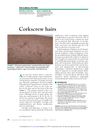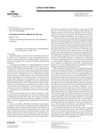 3 citations,
January 2017 in “Journal of Pakistan Association of Dermatology”
3 citations,
January 2017 in “Journal of Pakistan Association of Dermatology” Women with certain types of hair loss may have low iron levels, and iron supplements could help.
 1 citations,
June 2019 in “Current developments in nutrition”
1 citations,
June 2019 in “Current developments in nutrition” A patient with Ehlers-Danlos Syndrome improved after treatment for fat malabsorption and essential fatty acid deficiency.
 August 2024 in “Journal of Cosmetic Dermatology”
August 2024 in “Journal of Cosmetic Dermatology” Telogen effluvium is linked to deficiencies in iron, vitamin B12, and thyroid function.
 May 2021 in “Open Access Macedonian Journal of Medical Sciences”
May 2021 in “Open Access Macedonian Journal of Medical Sciences” People with premature hair graying have an imbalance between harmful and protective molecules in their body, hinting that antioxidants might help.
 June 2018 in “Disease-a-Month”
June 2018 in “Disease-a-Month” Remove inflamed cysts surgically, avoid topical antibiotics on wounds, treat skin and mouth conditions with specific medications, and address underlying causes of hair loss.
 207 citations,
April 2006 in “Journal of The American Academy of Dermatology”
207 citations,
April 2006 in “Journal of The American Academy of Dermatology” Iron deficiency may be related to hair loss, but there's not enough evidence to recommend iron screening or supplements for all hair loss patients.
 50 citations,
November 2010 in “Otolaryngologic Clinics of North America”
50 citations,
November 2010 in “Otolaryngologic Clinics of North America” Recognizing oral symptoms can help diagnose and treat blood and nutritional diseases early.
 19 citations,
March 2021 in “Obesity surgery”
19 citations,
March 2021 in “Obesity surgery” Many people experience hair loss after weight loss surgery, especially younger women, and it's linked to lower levels of zinc, folic acid, and ferritin.
13 citations,
July 2018 in “Obesity surgery” Over half of patients had hair loss after weight-loss surgery, especially women, linked to low zinc and vitamin B12 levels.
 10 citations,
August 2021 in “Journal of Cosmetic Dermatology”
10 citations,
August 2021 in “Journal of Cosmetic Dermatology” Most patients with telogen effluvium had low iron and vitamin D levels; iron supplements were commonly prescribed.

Good nutrition may help prevent premature hair graying.
 January 2021 in “Turkiye Klinikleri Journal of Dermatology”
January 2021 in “Turkiye Klinikleri Journal of Dermatology” Many young men with hair loss have low levels of vitamin D and B12.
 13 citations,
August 2020 in “Journal of Laparoendoscopic & Advanced Surgical Techniques”
13 citations,
August 2020 in “Journal of Laparoendoscopic & Advanced Surgical Techniques” Biotin supplements are generally ineffective in preventing hair loss after sleeve gastrectomy.
 231 citations,
July 2008 in “Nutrition reviews”
231 citations,
July 2008 in “Nutrition reviews” Diet changes can protect against harmful environmental effects on fetal development.
 28 citations,
December 2019 in “Skin appendage disorders”
28 citations,
December 2019 in “Skin appendage disorders” Some medications might reverse gray hair, especially those that reduce inflammation or stimulate pigment production, and vitamin B might help.
 3 citations,
April 2015 in “Cleveland Clinic Journal of Medicine”
3 citations,
April 2015 in “Cleveland Clinic Journal of Medicine” The woman has scurvy and needs more vitamin C.
 1 citations,
February 2023 in “Digestive diseases and sciences”
1 citations,
February 2023 in “Digestive diseases and sciences” Gastroparesis may cause hair loss due to micronutrient deficiencies, and multivitamins might help.
 1 citations,
December 2017 in “Skin appendage disorders”
1 citations,
December 2017 in “Skin appendage disorders” Biotin may help women with hair loss who have low biotin levels, but more research is needed.
 1 citations,
January 2010 in “Springer eBooks”
1 citations,
January 2010 in “Springer eBooks” Certain micronutrients may improve hair and nail health, but more research is needed to confirm their benefits.
 79 citations,
January 2017 in “Dermatology practical & conceptual”
79 citations,
January 2017 in “Dermatology practical & conceptual” Correcting nutrient deficiencies may help with hair loss, but the benefits of supplements without a deficiency are uncertain and could be harmful.
 57 citations,
February 2018 in “Journal of the American Academy of Dermatology”
57 citations,
February 2018 in “Journal of the American Academy of Dermatology” Biotin supplements are not proven to improve hair or nails and may interfere with medical tests.
 49 citations,
July 2021 in “Nutrients”
49 citations,
July 2021 in “Nutrients” Eating healthy, exercising, and taking certain supplements can help manage Polycystic Ovary Syndrome symptoms.
 37 citations,
October 2004 in “Adolescent Medicine Clinics”
37 citations,
October 2004 in “Adolescent Medicine Clinics” Bariatric surgery may help severely obese teenagers but has risks and requires careful patient selection and long-term care.
 35 citations,
January 2013 in “International Journal of Trichology”
35 citations,
January 2013 in “International Journal of Trichology” Kids with early graying hair often have low levels of calcium, ferritin, and vitamin D3.
 14 citations,
October 2020 in “Natural Products and Bioprospecting”
14 citations,
October 2020 in “Natural Products and Bioprospecting” Various treatments, including FDA-approved drugs, natural products, and oral supplements, can help with hair loss, but a patient's medical history and potential allergies should be considered when choosing a treatment.
 9 citations,
September 2018 in “Clinical, Cosmetic and Investigational Dermatology”
9 citations,
September 2018 in “Clinical, Cosmetic and Investigational Dermatology” One supplement improved hair loss and quality faster and more effectively than the other in treating telogen effluvium.
 7 citations,
January 2016 in “Hair therapy & transplantation”
7 citations,
January 2016 in “Hair therapy & transplantation” People with early graying hair often have lower levels of iron, ferritin, and calcium.
 4 citations,
August 2018 in “Journal of The American Academy of Dermatology”
4 citations,
August 2018 in “Journal of The American Academy of Dermatology” The authors agree that biotin may help certain hair disorders but lacks evidence for use in healthy people and call for more research.
 October 2017 in “The American journal of gastroenterology”
October 2017 in “The American journal of gastroenterology” Three patients suffered severe health issues due to not getting enough vitamins and minerals after weight-loss surgery.
 98 citations,
October 2012 in “Dermatologic Clinics”
98 citations,
October 2012 in “Dermatologic Clinics” Eating the right nutrients can improve hair health, but taking extra supplements usually doesn't help unless you have a deficiency.





























